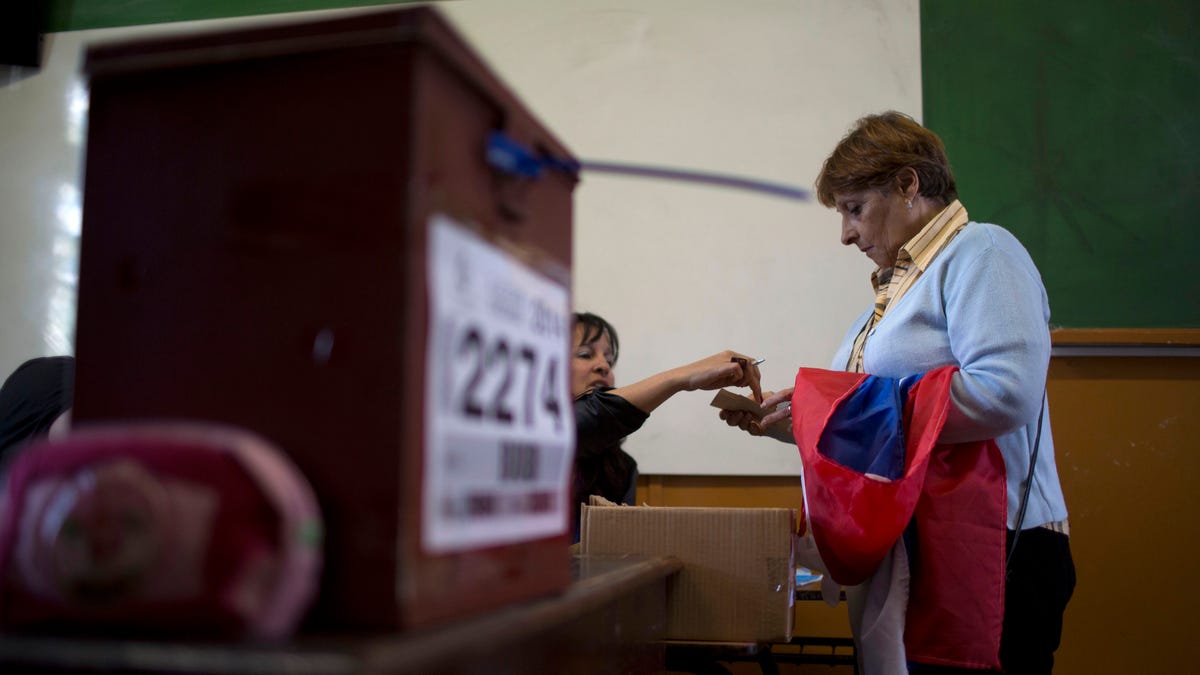
Voter Ana Perez arrives at a polling station with a flag representing the ruling Broad Front party draped over her arm, in Montevideo, Uruguay Sunday, Oct. 26, 2014. Polls suggest that Broad Front candidate Tabare Vazquez, will fall short of the absolute majority, forcing a runoff next month. His main challenger is center-right National Party candidate Luis Alberto Lacalle Pou, the son of a former president. (AP Photo/Natacha Pisarenko)
MONTEVIDEO, Uruguay (AP) – Uruguayans were choosing a new president Sunday in a contest that could also determine the future of the country's pioneering marijuana law.
Outgoing President Jose Mujica led Uruguay through economic prosperity and gained worldwide acclaim for social reforms such as the legalization of marijuana and gay marriage. His left-leaning Broad Front coalition leads in the election to replace him, but victory in the first round is far from certain.
"I want the Broad Front to win in a first round, but I know it's hard," said Virginia Picun, 37, a nurse who voted at a public school in Montevideo joined by her husband and their two children.
"I want the Broad Front to continue in the government because I've seen how much it's improved Uruguay in these years."
Polls suggest that Broad Front candidate Tabare Vazquez, 74, will fall short of the absolute majority, forcing a runoff next month. His main challenger is center-right National Party candidate Luis Alberto Lacalle Pou, the son of a former president.
If elected, Lacalle Pou, 41, promises to tackle rising crime, improve education and modify the law that Mujica spearheaded to create the world's first national marketplace for legal marijuana. Although he would still allow consumers to grow the plants at home for personal use, he would end the government's role in the production and sales of pot.
In distant third is Pedro Bordaberry, 54, of the Colorado Party, whose father was elected president then seized power as a dictator. Bordaberry opposes the marijuana law and has vowed to repeal it if elected.
Mujica, who was barred by law from running for another term, remains popular after steering Uruguay through a period of economic growth and rises in wages. But his social reforms are less popular at home, and critics say his administration failed to deal with problems in education, security and environmental protection — all pillars of his presidential agenda.
"I want change," said Sofia Rímola, 25, a journalism student who wore a National Party button as she voted. "I want more education and improved health services."
Rising crime has also raised security concerns among the South American nation's 3.2 million citizens. As for education, Uruguay's students have tested among the worst in the world for mathematics, science and reading comprehension.
The Broad Front, a coalition of center-leftists, communists and former guerrilla leaders, had 44 percent support of voters going into the election, according to a survey of 2,008 voters taken Oct. 4-19 by Uruguayan pollster Factum.
The National Party was second at 32 percent, while support for the right-wing Colorado party was 15 percent. The survey had a margin of error of plus or minus two percentage points.
Uruguayans will cast ballots for president and lawmakers at the same time, which means the Broad Front could also lose its legislative majority. Voters will also vote in a plebiscite on whether to reform the constitution to lower the age a person can be criminally charged as an adult from 18 to 16.
Follow us on twitter.com/foxnewslatino
Like us at facebook.com/foxnewslatino











































